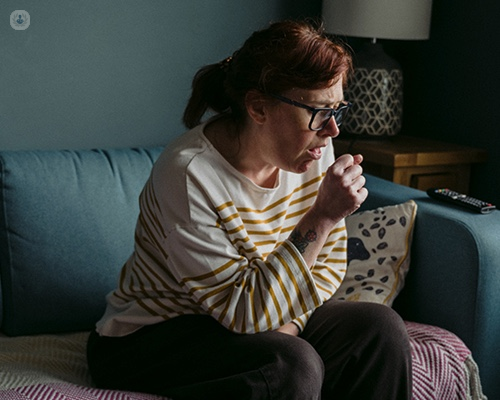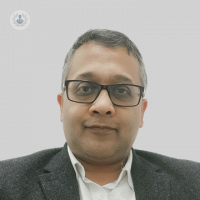When coughing won’t stop: chronic cough diagnosis and treatment
Written by:Usually, coughing episodes subside after two to three weeks. However, they can persist for much longer and consequently, impact a person’s quality of life. A chronic cough can signify many respiratory conditions and so it’s important to seek medical help. Professor Indranil Chakravorty has spent many years working in the management of chronic cough and in this article, he provides you with what to expect in its diagnosis and treatment.

What is classed as a chronic cough?
Coughs are categorised by their duration:
- Acute cough: less than three weeks
- Sub-acute cough: three to eight weeks
- Chronic cough: 8+ weeks
Shorter episodes of coughing are often associated with viral respiratory infections, asthma, chronic obstructive pulmonary disease (COPD) and pneumonia. Sub-acute coughs may also be caused by upper airway cough syndrome (UACS). Chronic coughs may be caused a variety of conditions, such as the formerly mentioned conditions, UACS from rhino-sinus conditions (inflammations of the nose), asthma, gastroesophageal reflux disease (GERD) and non-asthmatic eosinophilic bronchitis.
Generally, the diagnosis of a chronic cough can takes weeks or months due to it being a symptom of many conditions.
How is a chronic cough diagnosed?
Stage 1
Most patients who develop a cough will see their GP first. A GP can exclude any obvious causes of coughing and will most likely order a chest x-ray to exclude any visible disease in the airways. Asthma and GERD (gastro-oesophageal reflux disease) are usually considered as causes and patients might be offered a trial of medication for these to try and resolve the cough.
Stage 2
The next stage is a referral to the hospital respiratory clinic, usually to a chest specialist, although referrals can be made to an ENT (an ear, nose and throat specialist) to exclude conditions that affect the nasal and laryngeal areas of the upper airways. Patients might also be referred to a gastroenterologist to exclude GERD. While under hospital care, it might be necessary to have tests such as a lung function test, a bronchoscopy and a CT scan of the sinuses and thorax.
Stage 3
When all known causes of chronic cough have been excluded and the cough is still persistent, the skills of a highly specialised chronic cough centre might be required. These clinics should provide a team of specialists from different medical disciplines to agree on the diagnosis and management of a patient’s chronic cough. Patients might undergo sleep studies and receive oesophageal function tests, measurements of their nasal sensitivity, advanced imaging of their upper airways and lungs, among other tests.
Non-pharmacological treatment measures
Non-medical means of treating a chronic cough include education on cough suppression strategies, vocal hygiene training and counselling on improving voluntary control over the cough.
- Cough control measures such as the Buteyko breathing technique have the potential to improve patients’ quality of life
- Yoga and tai chi can be effective in patients with COPD. Also, mindfulness techniques have been shown to improve patients’ handling of their breathlessness
Pharmacological Measures
There is a wide range of medical treatments available and the right one for you depends on the cause of your chronic cough. Some examples are:
- Macrolide antibiotic treatment: these are for patients who are non-asthmatic and who have normal chest x-ray findings. This treatment can have a beneficial effect on the lungs’ function
- Inhaled corticosteroids: these aren’t found to be effective in treating chronic cough, but can be helpful in patients with asthma or eosinophilic bronchitis
- Proton-pump inhibitors (PPI): these can be effective in patients who do not have significant GERD
- Codeine and morphine: when all other therapeutic options have failed, these may be considered
The treatment of chronic cough can be a long process with many diagnostic tests involved to discover the source of the cough. Based on your specific case, your specialist will advise you on which treatments could be the most effective for you.
Learn how Professor Chakravorty can help you with your respiratory health and get in touch with him via his profile.


